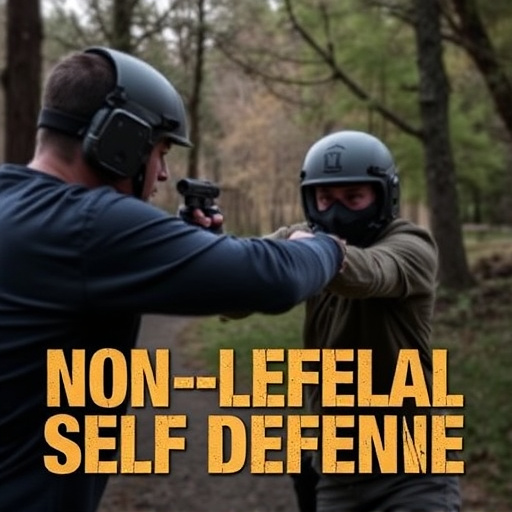Pepper spray temporarily disables through capsaicin, with effects lasting 20-60 minutes affected by concentration and environmental conditions. Storage, handling, and expiration date maintenance are crucial for effectiveness. Legality varies by location; understand local laws and use strategically in emergency scenarios.
“Stay safe with pepper spray, a powerful self-defense tool that can provide critical protection in potentially dangerous situations. This comprehensive guide explores the inner workings of pepper spray and its active ingredients, revealing how long their effects last. We’ll also dissect factors influencing effectiveness, from environmental conditions to proper application techniques. Learn essential storage practices to maximize longevity and navigate legal considerations surrounding its use. By understanding these aspects, you’ll gain valuable insights into ensuring your safety.”
- Understanding Pepper Spray's Active Ingredients and Their Duration
- Factors Affecting Pepper Spray Effectiveness and Longevity
- Safe Storage and Handling Practices for Optimal Lifespan
- Legal Considerations: When and Where Can You Legally Use Pepper Spray?
Understanding Pepper Spray's Active Ingredients and Their Duration
Pepper spray, a popular self-defense weapon, works by causing temporary disorientation and pain through its active ingredients. These ingredients, typically capsaicin or oleoresin capsicum (OC), are derived from chili peppers. When sprayed, they come into contact with the eyes, nose, and mouth, leading to a burning sensation and reduced visibility. The effects of pepper spray are designed to be short-lived, offering a crucial window for self-defense.
The duration of these effects varies based on factors like the concentration of capsaicin, the amount of spray used, and individual sensitivity. Typically, the effects can last from 20 minutes to an hour. Understanding how long pepper spray lasts is vital as it allows users to plan their escape and seek help during this vulnerable period.
Factors Affecting Pepper Spray Effectiveness and Longevity
The effectiveness and longevity of pepper spray as a self-defense weapon are influenced by several key factors. One of the primary considerations is the quality and concentration of the active ingredient, capsaicin. Higher concentrations typically result in longer-lasting effects, often lasting between 20 to 60 minutes, depending on the brand and formulation.
Environmental conditions play a significant role as well. Weather, humidity, and temperature can impact how quickly the spray dissipates and its overall effectiveness. In humid conditions, for example, pepper spray may lose potency faster due to the reduced evaporation rate of the active ingredients. Additionally, wind or air currents can disperse the spray more rapidly, potentially reducing its impact distance and intensity.
Safe Storage and Handling Practices for Optimal Lifespan
Proper storage and handling are paramount to ensuring your pepper spray remains effective for its intended lifespan. Keep it in a cool, dry place away from direct sunlight and extreme temperatures, as these conditions can degrade the active ingredients. Store it out of reach of children and unauthorized individuals to maintain safety.
When handling pepper spray, avoid touching the nozzle or pump mechanism with your fingers. Use clean gloves if possible, and never point the spray at anyone unless in a self-defense situation. Regularly check the expiration date, as pepper spray’s potency can diminish over time. Replacing it before its effectiveness wanes ensures you’re prepared when facing potential threats, understanding how long pepper spray effects last is crucial for strategic deployment during emergency scenarios.
Legal Considerations: When and Where Can You Legally Use Pepper Spray?
The legality of carrying and using pepper spray for self-defense varies significantly from one jurisdiction to another. Before considering it as a personal defense tool, it’s crucial to understand the specific laws in your area. In many places, pepper spray is legal for individuals aged 18 or over, but there are restrictions on where and when it can be used. Typically, pepper spray is permitted for self-defense inside private residences, vehicles, and during certain outdoor activities like hunting or target practice. However, its use in public spaces, especially in the presence of non-threatening individuals, can lead to legal repercussions.
Knowing how long pepper spray effects last is also essential. The duration of its impact varies depending on factors like concentration, delivery method, and individual sensitivity. Typically, a single shot of pepper spray can incapacitate an assailant for several minutes, providing enough time for escape or help arrival. However, prolonged exposure or multiple doses could lead to more severe and long-lasting effects, including breathing difficulties and pain. Always remember that legal considerations and the specific context of use are paramount when employing pepper spray as a self-defense mechanism.
Pepper spray, when used responsibly and in accordance with local laws, can be an effective self-defense tool. Understanding its active ingredients, how they interact with the body, and factors influencing their effectiveness is crucial for optimal performance. Safe storage practices are essential to maintain its lifespan, while legal considerations ensure its responsible use. Remember, knowing your rights and taking preventive measures can make a significant difference in personal safety.
